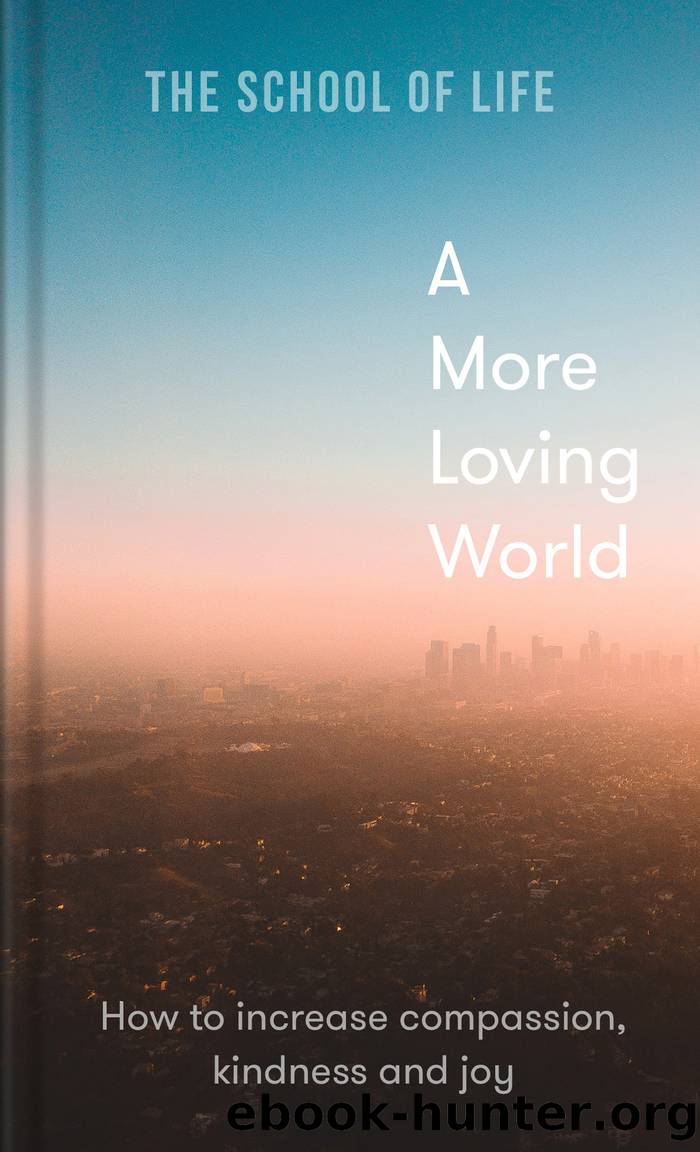A More Loving World by The School of Life

Author:The School of Life
Language: eng
Format: epub
Publisher: The School of Life
Our tragic condition
When it comes to our sense of who does and doesnât deserve punishment, we tend to operate with a simple dichotomy: either someone is guilty, and therefore must pay for their misdeeds, or they are innocent and should be allowed to walk free. Off the back of this divergence, we also know how to apportion our sympathies: the innocent merit our concern, the blameworthy have it coming to them.
And yet when we examine a great many lives from close up, a more troubling reality comes to light. In scenarios we know as âtragicâ, the apportioning of blame becomes impossible. A person may have done something quite wrong: they ended a relationship tactlessly, they had an affair, they lost their temper and said words they shouldnât. Their behaviour has clearly earned them some form of comeuppance.
But itâs the sheer scale of this eventual comeuppance that can tip due process into tragedy. In certain cases, after an affair has ended tactlessly, the rejected party doesnât merely weep and take their leave; they may seek to destroy their exâs reputation, post untrue allegations online and get them discredited among all potential employers. Or, equally tragically, they may kill themselves â exacting a life-long burden of guilt. Alternatively, a fleeting hot-tempered moment at work one afternoon might mean that someone is hauled before a tribunal, sacked for gross misconduct and can never find another job again, prompting the collapse of their marriage and the destruction of their relationship with their children. There are lives that are undone by a single word or email.
What defines tragedy is the disproportion between offence and punishment. There may be some primary fault: a lapse of reason, a degree of selfishness, an instance of lust or greed. But the toll is appalling and mesmerising in its scale and reach. It was the ancient Greeks who first and best identified this possibility, named it tragic and gave rise to a tradition of writing plays in which one could, at close quarters, follow the disintegration of someoneâs life from a relatively minor error to disaster, shame and death.
In the works of the great Greek tragedians â Aeschylus, Euripides, Sophocles â we observe intelligent, well-disposed characters who make errors of the sort we are all guilty of but, through the spiteful machinations of fate, have to pay an exceptional price for them. In Euripidesâ Medea, Jason, an adventurer and an ambitious politician, grows bored of his wife, Medea. It is understandable enough: they have two children, the marriage has been lengthy, long relationships can be stifling. Jason finds himself falling in love with the beautiful and younger Glauce, daughter of King Creon; it happens all the time. What Jason does not foresee is Medeaâs response: so incensed is she by the betrayal, so fragile is her mind, that she exacts revenge in the only way she knows will truly destroy Jason: by ending the lives of their children.
Tragedy is sadly not limited to legendary examples on the stage that we can leave behind after a few hours.
Download
This site does not store any files on its server. We only index and link to content provided by other sites. Please contact the content providers to delete copyright contents if any and email us, we'll remove relevant links or contents immediately.
Kathy Andrews Collection by Kathy Andrews(10520)
The remains of the day by Kazuo Ishiguro(7551)
Spare by Prince Harry The Duke of Sussex(4198)
Paper Towns by Green John(4169)
The Body: A Guide for Occupants by Bill Bryson(3802)
Be in a Treehouse by Pete Nelson(3213)
Harry Potter and the Goblet Of Fire by J.K. Rowling(3046)
Goodbye Paradise(2964)
Never by Ken Follett(2881)
Into Thin Air by Jon Krakauer(2701)
The Remains of the Day by Kazuo Ishiguro(2618)
The Genius of Japanese Carpentry by Azby Brown(2609)
The Cellar by Natasha Preston(2595)
Drawing Shortcuts: Developing Quick Drawing Skills Using Today's Technology by Leggitt Jim(2532)
120 Days of Sodom by Marquis de Sade(2438)
Architecture 101 by Nicole Bridge(2350)
The Man Who Died Twice by Richard Osman(2300)
Machine Learning at Scale with H2O by Gregory Keys | David Whiting(2291)
Fairy Tale by Stephen King(2070)
